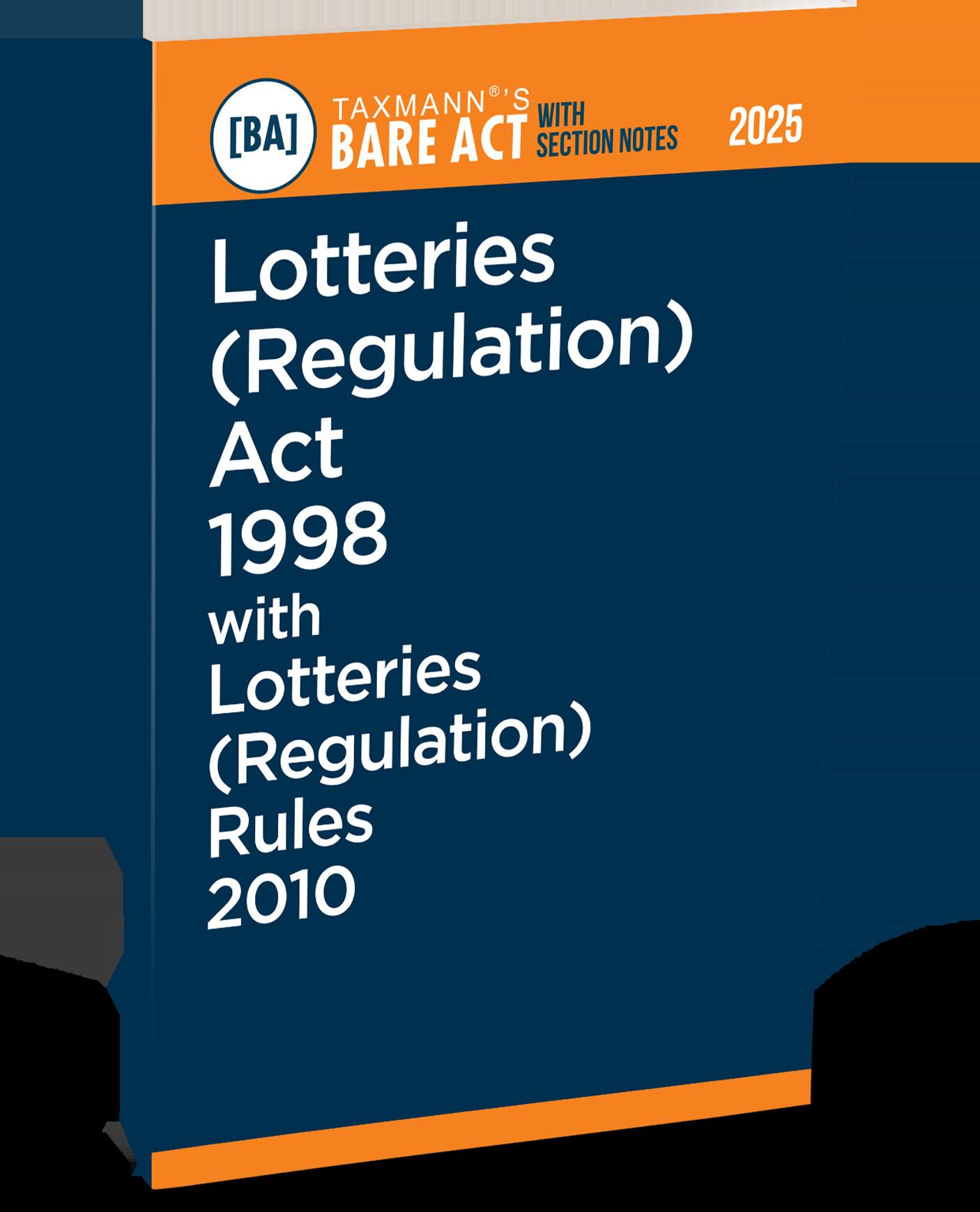







LOTTERIES (REGULATION) ACT, 1998
LOTTERIES (REGULATION) RULES, 2010
4. Appointment of distributor or selling agent 18
5. Procedure to prohibit the sale of lottery tickets by the Central Government 18










4. Appointment of distributor or selling agent 18
5. Procedure to prohibit the sale of lottery tickets by the Central Government 18

[17 OF 1998]
An Act to regulate the lotteries and to provide for matters connected therewith and incidental thereto.
BE it enacted by Parliament in the Forty-ninth Year of the Republic of India as follows:—
Short title, extent and commencement.
1. (1) This Act may be called the Lotteries (Regulation) Act, 1998*.
(2)It extends to the whole of India.
(3)It shall be deemed to have come into force on the 2nd day of October, 1997. Definitions.
2. In this Act, unless there is anything repugnant in the subject or context,
(a)“bumper draw of a lottery” means a special draw of lottery conducted on or during any festival or other special occasion wherein the prize money offered is greater than the prize money offered in the case of other ordinary draw of lotteries;
(b)“lottery” means a scheme, in whatever form and by whatever name called, for distribution of prizes by lot or chance to those persons participating in the chances of a prize by purchasing tickets;
(c)“prescribed” means prescribed by rules made under this Act.
2.1 Definition of Bumper Draw of a Lottery [Section 2(a)] “Bumper draw of a lottery” means a special draw of lottery. A bumper draw is conducted on or during: Any festival, or
*Dated 7-7-1998.
Any other special occasion.
The prize money offered in a bumper draw of a lottery is greater than the prize money offered in the case of other ordinary draws of lotteries.
2.2 Definition of Lottery [Section 2(b)]
“Lottery” means a scheme.
A lottery can exist in whatever form and can be called by whatever name.
The purpose of a lottery is for the distribution of prizes.
Prizes are distributed: By lot, or By chance.
Prizes are distributed to those persons participating in the chances of a prize.
Participation in the chances of a prize is achieved by purchasing tickets.
Prohibition of lotteries.
3. Save as otherwise provided in section 4, no State Government shall organise, conduct or promote any lottery.
CASE LAWS
Lottery Distributors and Bid Rigging - Applicability of Competition Law - In this case, the Competition Commission of India (CCI) initiated an inquiry into alleged cartelization and bid rigging in the tender process for appointing lottery distributors for the Mizoram State Lottery. The tender bids were identical, quoting the minimum permissible rates, raising suspicion of collusive practices. The Gauhati High Court, however, quashed the proceedings on the ground that lottery is res extra commercium and outside the scope of the Competition Act, 2002. The Supreme Court reversed this decision, holding that while lottery business may be regulated under the Lotteries (Regulation) Act, the process of appointing distributors and the services they provide constitute a “service” under section 2(u) of the Competition Act. The Court clarified that anti-competitive practices in the lottery business, such as collusion in tendering, fall squarely within the CCI’s jurisdiction, irrespective of the lottery’s classification as gambling. It ruled that the High Court’s intervention was premature and that CCI proceedings must be allowed to continue. Therefore, the appeals were allowed and the investigation into bid rigging was permitted to proceed — Competition Commission of India v. State of Mizoram AIRONLINE 2022 SC 46.
Conditions subject to which lotteries may be organised, etc.
4. A State Government may organise, conduct or promote a lottery, subject to the following conditions, namely:
(a) prizes shall not be offered on any pre-announced number or on the basis of a single digit;
(b) the State Government shall print the lottery tickets bearing the imprint and logo of the State in such manner that the authenticity of the lottery ticket is ensured; S. 4
(
(c) the State Government shall sell the tickets either itself or through distributors or selling agents;
(
(
d) the proceeds of the sale of lottery tickets shall be credited into the public account of the State;
e) the State Government itself shall conduct the draws of all the lotteries;
(f) the prize money unclaimed within such time as may be prescribed by the State Government or not otherwise distributed, shall become the property of that Government;
g) the place of draw shall be located within the State concerned;
(h) no lottery shall have more than one draw in a week;
(i) the draws of all kinds of lotteries shall be conducted between such period of the day as may be prescribed by the State Government;
(j) the number of bumper draws of a lottery shall not be more than six in a calendar year;
(k) such other conditions as may be prescribed by the Central Government.
CASE LAWS
Weekly draw and single digit lottery – Interpretation of scheme - The petitioner challenged the Karnataka State Government’s practice of conducting daily lotteries under various names, alleging that it violated sections 4(a) and 4(h) of the Lotteries (Regulation) Act, 1998, which prohibit prizes based on single digits or pre-announced numbers and restrict a lottery scheme to only one draw per week. The High Court of Karnataka rejected the petition, holding that the government had structured different schemes with unique names and formats for each day, ensuring no one scheme had more than one draw in a week. On the allegation of single-digit-based prizes, the Court observed that although one digit was pre-fixed (0–9), the second digit was randomly drawn and participants needed both digits to win, making it a two-digit scheme. The Court concluded that this method did not breach section 4(a) as prizes were not based on a single digit alone, nor did it violate section 4(h) since each scheme was only drawn once weekly. Thus, the state’s model, though clever, complied with the statutory framework — Ashvin S. N. v. Union of India AIR 2005 KARNATAKA 88.
Prohibition of sale of ticket in a State.
5. A State Government may, within the State, prohibit the sale of tickets of a lottery organised, conducted or promoted by every other State.
CASE LAWS
Prohibition of other States’ Lotteries - The appellants, involved in organizing and promoting lotteries under the authority of the State of Nagaland, challenged a notification issued by the State of Kerala prohibiting the sale of other States’ lottery tickets within its territory. Kerala justified the ban under section 5 of the Lotteries (Regulation) Act, 1998. 3
The Supreme Court upheld the notification, reiterating its earlier interpretation in B.R. Enterprises that a State can validly prohibit the sale of other States’ lotteries only if it does not itself organize, conduct, or promote any lottery. The Court examined Kerala’s stance and found that it had indeed declared itself a lottery-free zone and had ceased its own lotteries. Therefore, the prohibition under section 5 was valid, constitutional, and non-discriminatory. The Court emphasized that once a State becomes a lottery-free zone, it can protect its citizens from the socio-economic harms of lotteries by disallowing sales from other States, and such prohibition does not violate Articles 301 or 303 of the Constitution. The appeals were dismissed – All Kerala Online Lottery Dealers Association v. State of Kerala 2015 AIR SCW 6210.
Lottery-Free zone declaration – Validity of State Policy - The State of Karnataka issued a notification under section 5 of the Lotteries (Regulation) Act, 1998, declaring itself a “lottery-free zone” and prohibiting the sale of all paper, online, and internet lotteries from both within the State and other States. This action was challenged by multiple petitioners including the States of Arunachal Pradesh and Sikkim, their lottery agents, and industry stakeholders, who argued that the notification was unconstitutional and ultra vires section 5. The Karnataka High Court upheld the notification, ruling that the power granted under section 5 was constitutionally valid, as already settled by the Supreme Court in B.R. Enterprises. The Court emphasized that lottery is a form of gambling, not a protected trade under Article 19(1)(g), and thus the policy decision of the State to prohibit all lotteries, after legislative approval and study of its social impact, was not arbitrary or disproportionate. The Court also rejected the plea for violation of natural justice, holding that States are not bound to grant hearings before adopting policy measures in public interest — State of Arunachal Pradesh v. Union of India AIR 2007 (NOC) 1819 (KANT.).
Online Lottery Ban – Agents’ right to challenge - The States of Sikkim and Meghalaya, through their appointed agents, challenged a Karnataka Government notification that banned the sale of online and internet-based lottery tickets within the State, issued under section 5 of the Lotteries (Regulation) Act, 1998. The State of Karnataka argued that since the dispute was inter-State, it fell exclusively under Article 131 of the Constitution, and private parties had no locus standi. The agents, having invested heavily in infrastructure and contracts, claimed independent legal rights to conduct business and challenged the ban through writ petitions. The Supreme Court held that although Article 131 covers disputes between States, it does not bar affected agents—especially those coupled with interest—from filing writ petitions under Article 226 when their legal rights are threatened. It recognized the agents’ contractual stakes and potential penal liability under section 7(3), affirming their access to judicial remedies. Consequently, the appeals were allowed, restoring the maintainability of writ petitions filed by agents against the State’s lottery ban — Tashi Delek Gaming Solutions Ltd. v. State of Karnataka AIR 2006 SUPREME COURT 661.
State’s power to ban Other States’ Lotteries without Central Direction - The petitioners challenged a notification issued by the State of Orissa prohibiting the sale of lottery tickets organized by other States, arguing that the State lacked such power without a direction from the Central Government under section 10 of the Lotteries (Regulation) Act, 1998. They also questioned the constitutional validity of section 5, though later abandoned that ground due to the Supreme Court’s ruling in B.R. Enterprises. The Orissa High Court upheld the validity of the State’s action, holding that section 5 independently empowers a State Government to prohibit within its territory the sale of tickets of lotteries conducted by other States, and this power does not depend on any prior directive under section 10. The Court clarified that section 10 relates to the Central Government’s supervisory authority to ensure proper execution of the Act but does not restrict a State’s discretion granted under section 5. Thus, the
AUTHOR : TAXMANN’S EDITORIAL BOARD
PUBLISHER : TAXMANN
DATE OF PUBLICATION : JULY 2025
EDITION : 2025 EDITION
ISBN NO : 9789371260503
NO. OF PAGES : 24
BINDING TYPE : PAPERBACK


Lotteries (Regulation) Act 1998, along with the Lotteries (Regulation) Rules 2010 [ Bare Act with Section Notes ], published by Taxmann, provides a concise statutory reference that covers the regulation, organisation, and oversight of lotteries in India. The 2025 Edition includes the complete, updated text of the Act and Rules, enric hed with expert section-wise notes, case law analysis, and clear commentary for practical understanding and compliance. This book is intended for the following audience:
• Legal Practitioners, Judges, and Law Firms
• Government Departments (State & Central)
• Lottery Operators, Distributors, and Selling Agents
• Enforcement & Regulatory Agencies
• Academicians, Law Students & Researchers
• Policy Makers & NGOs
The Present Publication is the 2025 Edition, covering the amend ed and updated text of the Lotteries (Regulation) Act [ Act No. 17 of 1998 ] and Rules, with the following noteworthy features:
• [Comprehensive Coverage] Full text of the Act and Rules with all amendments
• [Section-wise Notes & Commentary] Expert explanations and legislative context
• [Case Law Digest] Summaries of leading Supreme Court and High Court decisions
• [User-friendly Structure] Subject index, section notes, and clear layout for quick reference
• [Latest Updates] Incorporates recent amendments and judicial developments
• [Compliance Guidance] Practical tips for conducting lotteries, appointing agents, and maintaining records
• [Penalties & Enforcement] Detailed discussion on offences and statutory penalties